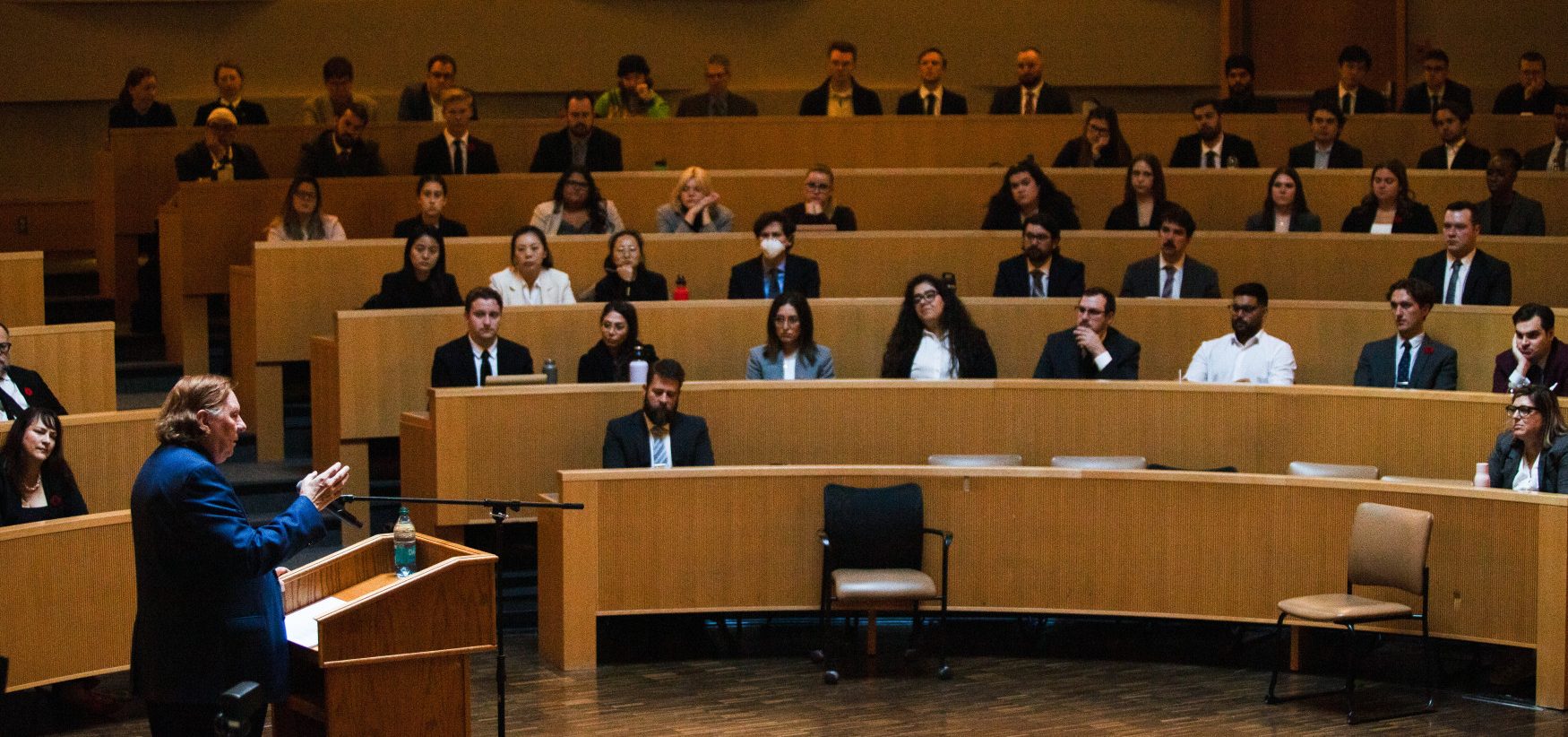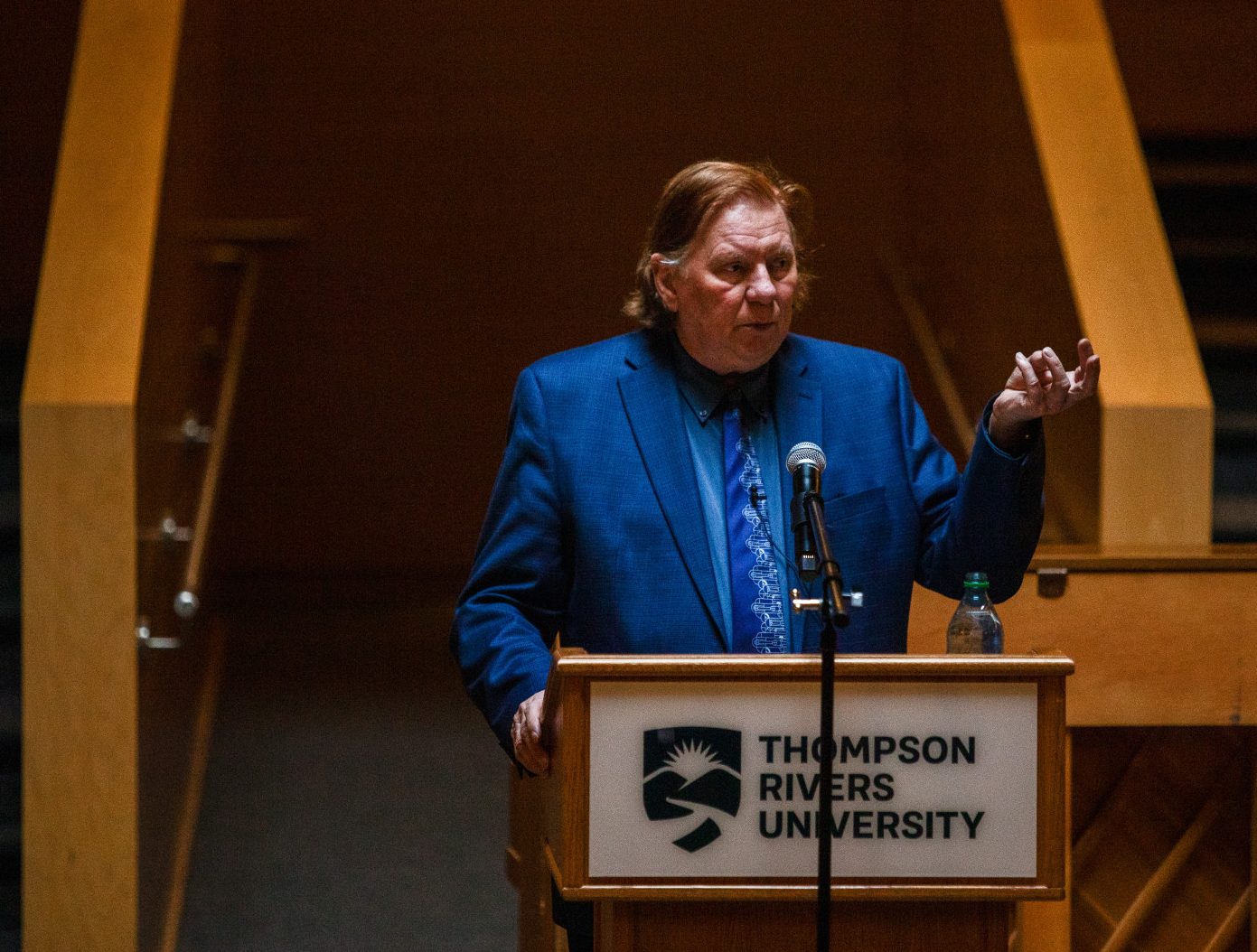
Supreme Court Justice discusses judicial scope creep
By Marissa Dederer
It’s not every day you have access to a Supreme Court of Canada judge outside of court.
On Thursday, Oct. 31, more than 100 Thompson Rivers University (TRU) Law students and faculty attended Justice Malcolm Rowe’s lecture in the Brown Family House of Learning, where he spoke about Canadian courts’ capacities and exercising judicial authority.
Rowe was the perfect person to deliver the address. His background includes working as a lawyer in government, a foreign services officer and an advisor to government ministers, said TRU Law Professor Blair Major.
“The other thing that is noteworthy about Justice Rowe is his judicial temperament,” said Major as he introduced Rowe. “Justice Rowe’s written decisions stand out. (He has) a way of cutting to the core of the issues that are at stake in a case and directly addressing them.”

Justice Rowe spoke about how the Constitutional Act, 1982 significantly changed the role of courts in public policy and the need to reflect on this role in the future.
“The Charter of Rights and Freedoms empowered the courts to invalidate laws and governmental actions and infringe on those rights,” he said. “At the same time, Section 35(1) of the Constitution Act protected Indigenous and treaty rights, which set the stage for their more complete recognition by the courts.
“Considering this, judicial restraint is important”, he said. The courts need to be mindful of their institutional capacity as well as the absence of checks and balances.
There are only nine judges on the Supreme Court of Canada, and they are appointed, rather than elected.
“We do not receive an electoral mandate and the legitimacy that flows from them,” said Rowe. “Our legitimacy comes from adhering to the rule of law and applying in a consistent, coherent, principled way the structure of laws and the overarching sense, the constitutional arrangements of the country.
“We are the referee or the umpire. We’re the ones who say how the system works.”
Courts should also respect the level of knowledge and expertise in other branches of the government, he said.
“Few judges have any experience or meaningful understanding of government,” Rowe said. “Counsel are often similarly lacking.”
The reason for that, he said, is found in their schooling. Lawyers are trained to handle specific legal disputes, not to manage or balance budgets. But the courts don’t have nearly the amount of institutional capacity as government.
In today’s world, which is after the establishment of the Constitution Act, 1982, Justice Rowe said the courts must exercise self-control. “Courts should exhibit the virtue of judicial restraint.”
Judge of all trades
Rowe was nominated to serve as a justice on the Supreme Court of Canada in October 2016 by Prime Minister Justin Trudeau, making him the first Supreme Court justice from Newfoundland and Labrador. He has written several notable dissenting opinions, including in the 2021 decision on the matter of the Greenhouse Gas Pollution Pricing Act, which put a price on carbon. While the majority found the act was constitutional, Rowe argued the opposite: that it did not take into consideration the provinces’ rights to manage their own natural resources.
During his time in private practice, Rowe worked on cases about Canada’s maritime boundary and concerns about high seas overfishing.
Justice Rowe graduated from York University’s Osgoode Hall Law School in 1978, after earning a Bachelor of Arts and a Bachelor of Science from Memorial University. He was called to the bar of Newfoundland and Labrador in 1978 and became a member of the Law Society of Upper Canada in 1986.
In addition to serving as a lawyer and judge, Justice Rowe was the clerk assistant in the House of Assembly of Newfoundland and Labrador, where he was a procedural advisor to the Speaker. Later he was a foreign service officer for the federal department of External Affairs (now Global Affairs). He also was the chief of the Executive Council and secretary to cabinet in the government of Newfoundland and Labrador.
